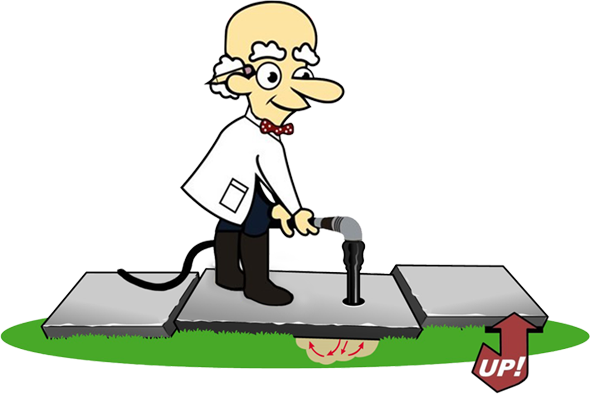IN THIS ARTICLE
By: Kris Winters
March 26th, 2024
Why Resurface Your Pool Deck?
Before we dive into the options and methods for pool deck resurfacing, let’s first understand why it is necessary.
Improve Safety and Functionality
A worn or damaged pool deck can be a safety hazard, especially for children and elderly swimmers. Cracks and uneven surfaces can cause trips and falls, while faded or slippery surfaces can lead to accidents. Resurfacing your pool deck can help eliminate these hazards and make your pool area safer.
Additionally, resurfacing can also improve the functionality of your pool deck. Over time, pool decks can become uneven, making it difficult to place furniture or walk around comfortably. Resurfacing can level out the surface and make it more functional for everyday use.
Enhance Aesthetics
A beautiful pool deck can enhance the overall appearance of your pool and backyard. Resurfacing can give your pool deck a fresh new look, making it more inviting and appealing. You can choose from various colors, patterns, and textures to create a unique and personalized pool deck that complements your home and landscape.
Increase Durability and Longevity
Pool decks are exposed to harsh weather conditions, constant foot traffic, and pool chemicals, which can cause wear and tear over time. Resurfacing can help strengthen and protect your pool deck, increasing its durability and longevity. This can save you money in the long run, as you won’t have to replace your pool deck as frequently.
Considerations Before Resurfacing Your Pool Deck
- Assessment of Current Condition: Before initiating the resurfacing process, thoroughly assess the current condition of your pool deck. Look for signs of damage, such as cracks, chips, stains, or uneven surfaces. Identifying these issues will help determine the extent of repairs needed before resurfacing can take place. Addressing any underlying structural problems, such as pool deck settlement through concrete leveling at this stage, will prevent them from worsening over time and ensure a smoother resurfacing process.
- Budget and Cost Estimation: Establishing a budget for the resurfacing project is essential to avoid overspending and financial strain. Research the cost of materials, labor, and additional expenses such as surface preparation and sealing. Obtain quotes from multiple contractors to compare prices and ensure you get a fair deal. When researching resurfacing costs, remember that investing in high-quality materials and skilled labor can result in a more durable and aesthetically pleasing finish that lasts for years to come.
- Selection of Materials: Choose suitable materials for your pool deck resurfacing project based on durability, aesthetics, and maintenance requirements. Standard options include stamped concrete overlays, spray knockdown textures, acrylic coatings, rubberized coatings, epoxy coatings, and tile overlays. Consider climate, usage patterns, and personal preferences when selecting the most suitable material for your pool deck.
- Climate Considerations: Consider the climate and weather conditions in your area when planning a pool deck resurfacing project. Certain materials may be more suitable for hot, sunny climates, while others are better suited to cold or wet environments. For example, acrylic coatings offer excellent UV resistance. They are ideal for pool decks in sunny regions, while rubberized coatings provide superior slip resistance and are suitable for areas prone to rain or humidity.
- Color and Design Options: Explore various color and design options to enhance the aesthetics of your pool deck and complement your outdoor surroundings. Many resurfacing materials offer customizable colors, patterns, and textures, allowing you to achieve the desired look for your pool area. Consider architectural style, landscaping themes, and personal preferences when selecting colors and designs for your pool deck resurfacing project.
- Maintenance Requirements: Evaluate the maintenance requirements of different resurfacing materials to ensure they align with your lifestyle and maintenance preferences. Some materials may require regular cleaning, sealing, or reapplication of protective coatings to maintain their appearance and performance over time. Factor in the time and effort needed for maintenance when selecting the most suitable material for your pool deck.
- Contractor Selection: Choosing a reputable and experienced contractor is crucial to the success of your pool deck resurfacing project. Search for local pool resurfacing contractors near me, read reviews, and ask for recommendations from friends, family, or neighbors who have undergone similar projects. Verify the contractor’s credentials, licenses, and insurance coverage before hiring them. Additionally, request references and view past projects to ensure they have the expertise and track record of delivering quality results.
Options for Pool Deck Resurfacing
Several options are available for pool deck resurfacing, each with its benefits and considerations. Let’s take a look at the most popular options.
- Stamped Concrete Overlays: Stamped concrete overlays are popular due to their versatility and aesthetic appeal. They involve applying a layer of concrete over the existing pool deck and imprinting it with patterns and textures that mimic stone, brick, or tile. This overlay option offers endless design possibilities and can be customized to complement any architectural style or landscaping theme.
- Spray Knockdown Texture: Spray knockdown texture overlays involve spraying a mixture of concrete and additives onto the pool deck surface, then knocking it down with a trowel to create a textured finish. Two well-known companies are Cool Deck and Sundek. This textured surface provides excellent slip resistance, making it ideal for pool decks where safety is a primary concern. Additionally, the textured appearance adds visual interest and helps conceal imperfections in the underlying surface.
- Acrylic Coatings: Acrylic deck coatings are a popular choice for pool deck resurfacing due to their durability, affordability, and aesthetic versatility. These coatings are typically applied as a thin layer over existing concrete surfaces and come in various colors, patterns, and finishes. Acrylic These coatings offer excellent UV resistance, preventing fading and discoloration caused by prolonged sun exposure. They also provide a cool, comfortable surface for bare feet, making them an ideal choice for pool decks in hot climates. You can learn more about how these products are applied in this video by Encore Coatings University: https://youtu.be/EunTU_vaTx4?si=LWLEIOZoF-oJhLT1
- Rubberized Coatings: Rubberized coatings are a practical option for pool decks, particularly in areas where flexibility and impact resistance are important. These coatings are made from a blend of rubber granules and binding agents, creating a resilient surface that can withstand heavy foot traffic and minor impacts. Rubberized coatings offer excellent slip resistance and shock absorption, making them a safe choice for pool decks frequented by children or elderly individuals.
- Epoxy Coatings: Epoxy coatings are known for their exceptional durability and chemical resistance, making them an ideal choice for pool decks exposed to harsh chemicals like chlorine. These coatings consist of two-part epoxy resins mixed and applied to the pool deck surface. Once cured, epoxy coatings form a tough, seamless membrane that resists stains, abrasion, and moisture penetration. They are available in various colors and can be customized with decorative flakes or aggregates for added visual appeal.
- Tile Overlays: Tile overlays are a luxurious option for pool deck surfaces, offering unmatched elegance and durability. These overlays involve installing individual tiles or mosaic patterns over the existing pool deck surface, creating a stunning visual effect. Tile overlays are available in various materials, including ceramic, porcelain, natural stone, and glass, allowing for endless design possibilities. While more expensive than other overlay options, tile overlays add value to the property and create a sophisticated poolside ambiance.
Pool deck resurfacing is essential to maintaining a safe, functional, and aesthetically pleasing pool deck. By understanding the different options and methods available, you can decide on your pool deck renovation. Whether you choose a concrete overlay, stamped concrete, pavers, or tile, resurfacing your pool deck can enhance its appearance, improve its functionality, and increase its durability and longevity.
If your concrete pool deck is uneven or sunken and needs repair, contact Concrete Chiropractor. We are experts in lifting settled concrete pool decks and can help restore your surfaces. Act quickly to correct your pool deck to prevent damage and improve the safety and appearance of your property.
You can read more concrete leveling and repair-related articles by visiting our learning center.
The Ultimate Guide to Fixing Concrete Pool Deck Settlement
Or contact us for a professional evaluation from one of our team experts.
Click here to contact Concrete Chiropractor now for a free quote!
- Garage Floor Raising and Coating: The Ultimate Guide - June 4, 2024
- Mudjacking Cost: 5 Factors That Affect It - April 10, 2024
- What is The Average Cost of Concrete Leveling in Belle Mead, NJ? - April 4, 2024





